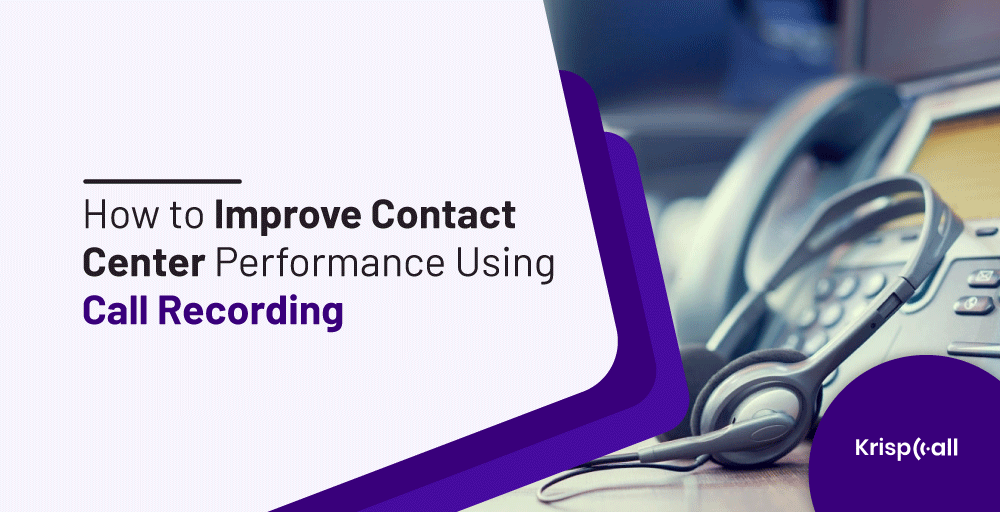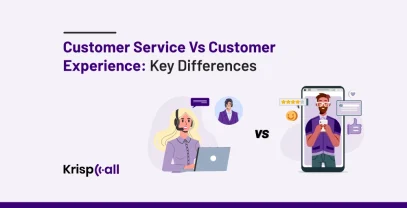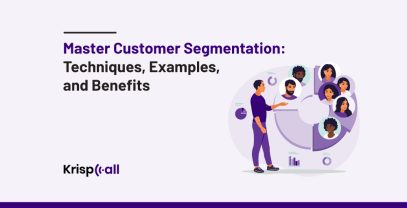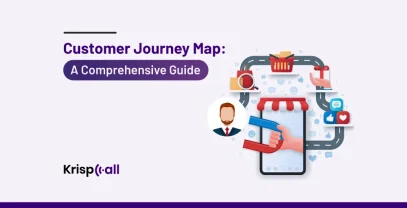It would be fair to say that a contact center plays a crucial role in the success of any business.
There was a time when it was often overlooked and considered secondary means to generate revenue, but today it is recognized as a tool that helps the business generate revenue by converting prospects into customers and, most importantly, retaining those customers’ expectations.
After all, the cost of winning a new customer is 8 times greater than the cost of retaining an existing one.
Whether you are a small company handling occasional client queries, or a large company making frequent cold calls, your business will thrive when you build relationships with your customers.
When consumers contact your business over the offline or online phone system, they expect more than just an excellent experience. Today, they expect an amazing experience across all channels and platforms.
And when it comes to improving your customer journey, it is beneficial for your business to have the capability of recording inbound and outbound calls.
This post covers the basic background of the contact center’s call recording features and highlights best practices to improve your contact center performance using the call features.
What Exactly is Call Recording?
Call recording is the process of recording audio conversations between the contact center or call center’s agents and the customers.
A good call recording software automatically records inbound, and outbound phone calls and digitally stores the audio file.
They even provide powerful analytics and processing functions that are essential for quality assurance. Monitoring and recording calls have been used for decades, and it is now used as one of the most effective methods for improving quality, customer satisfaction, and loyalty.
Companies that use more sophisticated recording solutions are equipped with tools that help them identify patterns and anomalies so that they can identify issues that affect their customer service and address them accordingly.
Why Call Recording is Important in Contact Centers?
There are many reasons why several organizations have been recording calls. Recording calls, for instance, can serve as an excellent method of protecting a company from liability, analyzing the contact center’s agent performance, ensuring compliance, and verifying orders.
Furthermore, these simulations have even been used to train agents for specific outcome scenarios.
Call time can be accelerated with the measurement of customer satisfaction and management of hold time. Because of these important metrics, you can better manage your workforce, knowing what to expect each day.
Recording calls directly improves efficiency, which in turn reduces call abandonment rates and increases customer loyalty. Though technology has offered a lot more, stats have shown that many businesses have wasted away a chunk of customer and agent insight data.
We’ve outlined 7 ways that show how call recordings can be used to improve the performance of the contact center and provide a better service to your customers and agents.
Monitor Quality Assurance Processes
Traditionally, telephone recording calls for quality assurance processes represent manual checklists and cover a mere percentage of agents.
Therefore, all the hidden information in the recordings is overlooked, which impedes management’s ability to see the quality of agents’ performances.
Recording solutions enable companies to categorize their calls and identify consumer trends (e.g., determine the cause of complaints), thereby improving the customer service quality.
Train Your Agents Better
Recording a call can be illuminating and enlightening. A lot of contact centers use both fantastic and tragic calls as training examples.
The experience of listening to these calls gives new agents a chance to observe both good and bad call techniques. It also gives trainers a chance to break down each part of the call as a teachable moment.

The call center agents training is an effective method for introducing new employees to provide exceptional customer service.
Recognize Trends and Find Sales Opportunities
Call recordings are indeed helpful to recognize sales opportunities and customer trends. If you want to conduct trend analysis, you need to evaluate 100% of your call recordings.
By relating desired outcomes to certain agent behaviors, skills, or language used, it is possible to predict call outcomes, such as a successful sale.
Therefore, if you analyze your call recordings with analytics, you can develop the best path by identifying multiple ways of making a sale and selecting the one that results in the best outcome.
The agents testing this path can be scored according to how well they adhere to the script or if they are able to identify language that suggests a willingness to purchase
Ensure Compliance
The consequences of non-compliance with regulations can be incredibly costly to your company, both financially and professionally.
Call recording solutions can be beneficial to fostering compliance, thereby protecting the integrity of your contact center.
In order to ensure the right compliance procedures are being followed, you should utilize the recordings to enhance monitoring capabilities.
Also, call recordings can be used to determine if agents are in compliance with organizational policies. Agents will be more likely to comply if they are aware that calls are being recorded. The rest can be gleaned from listening to calls and coaching the agents.
Create Better Scripts
A phone call script is a part of a robust customer service strategy for creating efficient customer service. Also known as call center script, it is pre-written documents that guide contact center representatives as they interact with customers.
Scripts reduce errors and provide answers so that representatives can provide accurate, efficient guidance to customers.

Using recorded audio data, you can identify certain behavioral patterns like the use of certain phrases that make the interest of the customers tune out or poor protocols that put customers on hold, causing them to request an escalation to a senior.
You May Also Like: Benefits of Customized Phone Greetings
Keeping these patterns in mind will help you make your call scripts more effective and ensure that your agents have more productive customer interactions.
Resolve Disputes and Miscommunications
There are times when customers and businesses disagree about the events that happened during a phone call.
Possibly, the customer claims they purchased a warranty they’re now trying to exercise, or maybe they weren’t given a financial disclosure from the agent.
Alternatively, it is possible for an agent to forget to record some of the critical information customers share during a phone call.
In turn, this may adversely affect the customer experience and call ratings. A call recording helps resolve disputes and miscommunication by capturing a direct record of a phone conversation.
Further, recording phone calls facilitate the more active participation of the agent during the call, and the agent doesn’t need to worry about missing any details. The overall result is much-improved customer support.
Invest in The Right Technology
The typical call center or contact center processes many incoming and outgoing calls daily. Without the right voice technology, recording, storing, and processing, and analyzing these calls may be impossible.

An effective setup (software and hardware) for recording and monitoring calls integrates seamlessly with the call center’s workflow.
This setup needs to also be able to serve its current and future needs with regard to recording and reporting.
Final Word
Most contact centers record these calls via software or apps integrated with their phone system, but an easier way is to choose a contact center platform or phone that includes built-in recording features, something that comes with integrated voice recording functionality.





